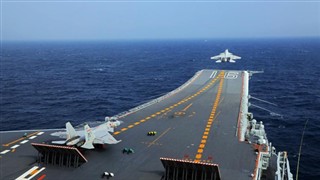The most troubling aspect of the Biden Administration’s National Security Policy is the lack of either realism or urgency. In historic terms, we are essentially living in conditions similar to those of the final few years leading up to the outbreak of the Second World War.
China has doubled its nuclear capabilities in the past two years. Its navy is larger than that of the United States. Russia has a larger and more modern nuclear arsenal that that of the U.S.
North Korea is rapidly moving towards making its nuclear weapons capable of reaching and devastating America’s. Iran, with its bizarre and angry-at-the-world leadership, will soon be a nuclear power.
These are not separate threats. They are a singular “Axis of Evil” intent on global hegemony. Russia has supplied nuclear fuel to help build China’s atomic arsenal. China provides financial assistance to Moscow’s invasion of Ukraine, and keeps North Korea financially afloat. Iran is supplying drone weaponry to Putin.
Neither Russia nor China have been coy about their intentions. Beijing has openly threatened the United States on several occasions, and boasts about its armed prowess.
A release from the Chinese Defence Ministry recently stated: “We have boosted military training and war preparedness across the board, firmly and flexibly carried out military struggles, and proactively opened up a new pattern. We have deepened the reform of national defense and the armed forces with great strides, resulting in the armed forces in a new system, a new structure, a new pattern and a new look, and adding up to a revolutionary reshaping on all fronts…We have innovatively strengthened the modernization of national defense and the armed forces to promote the high-quality development of the armed forces, improving military’s modernization level and actual combat capability to a new height.”
Putin continues to rattle his nuclear saber. The Center for Arms Control and Nonproliferation reveals that “Russia now has the largest nuclear inventory in the world…The country has made significant progress toward fully modernizing its Soviet-era nuclear weapons and delivery systems…”
The recently released “Annual Threat Assessment Of The U.S. Intelligence Community” released by the Director of National Intelligence warns that “During the coming year, the United States and its allies will confront a complex and pivotal international security environment…Strategic competition between the United States and its allies, China, and Russia over what kind of world will emerge makes the next few years critical to determining who and what will shape the narrative perhaps most immediately in the context of Russia’s actions in Ukraine, which threaten to escalate into a broader conflict between Russia and the West….Russia’s unprovoked full-scale invasion of Ukraine has highlighted that the era of nation-state competition and conflict has not been relegated to the past but instead has emerged as a defining characteristic of the current era… Russia’s military action against Ukraine demonstrates that it remains a revanchist power, intent on using whatever tools are needed to try to reestablish a perceived sphere of influence despite what its neighbors desire for themselves, and is willing to push back on Washington both locally and globally.
“China has the capability to directly attempt to alter the rules-based global order in every realm and across multiple regions, as a near-peer competitor that is increasingly pushing to change global norms and potentially threatening its neighbors.
“Besides these strategic competitors, local and regional powers are seeking to exert their influence, often at the cost of neighbors and the world order itself.
“Iran will remain a regional menace with broader malign influence activities, and North Korea will expand its WMD capabilities while being a disruptive player on the regional and world stages.
“Efforts by Russia, China, and other countries to promote authoritarianism and spread disinformation is helping fuel a larger competition between democratic and authoritarian forms of government. This competition exploits global information flows to gain influence and impacts nearly all countries, contributing to democratic backsliding, threats of political instability, and violent societal conflict through misinformation and disinformation.
“Regional and localized conflicts and instability will continue to demand U.S. attention as states and nonstate actors struggle to find their place in the evolving international order, attempt to navigate great power competition, and confront shared transnational challenges.
“Regional challengers, such as Iran and North Korea, will seek to disrupt their local security environment and garner more power for themselves, threatening U.S. allies in the process.”
Illustration: Chinese Defense ministry
